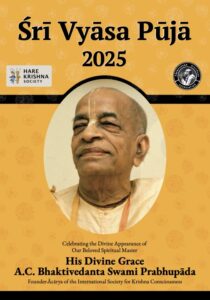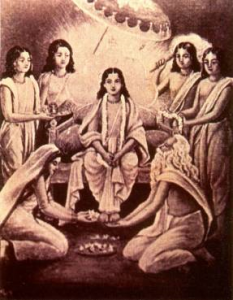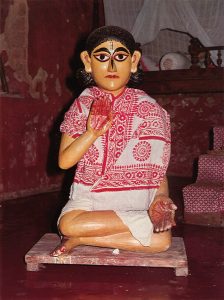The appearance of Kṛṣṇa is the answer to all imaginative iconography of the Supreme Personality of Godhead.
SB 10.2.35 purport…Only by the mercy of the Supreme Personality of Godhead can one understand Him. Those who are in the modes of material nature, although speculating for thousands of years, cannot understand Him. The Lord has innumerable forms (rāmādi-mūrtiṣu kalā-niyamena tiṣṭhan [Bs. 5.39]), and unless these forms, such as Lord Rāmacandra, Nṛsiṁhadeva, Kṛṣṇa and Balarāma, were transcendental, how could they be worshiped by devotees since time immemorial? Bhaktyā mām abhijānāti yāvān yaś cāsmi tattvataḥ (Bg. 18.55). Devotees who awaken their transcendental nature in the presence of the Lord and who follow the rules and regulations of devotional service can understand Lord Kṛṣṇa, Lord Rāmacandra and other incarnations, who are not of this material world but who come from the spiritual world for the benefit of people in general. If one does not take to this process, one imagines or manufactures some form of God according to material qualities and can never awaken a real understanding of the Supreme Personality of Godhead. The words bhaktyā mām abhijānāti yāvān yaś cāsmi tattvataḥ signify that unless one worships the Lord according to the regulative devotional principles, one cannot awaken the transcendental nature. Deity worship, even in the absence of the Supreme Personality of Godhead, awakens the transcendental nature of the devotee, who thus becomes increasingly attached to the Lord’s lotus feet.
The appearance of Kṛṣṇa is the answer to all imaginative iconography of the Supreme Personality of Godhead. Everyone imagines the form of the Supreme Personality of Godhead according to his mode of material nature. In the Brahma-saṁhitā it is said that the Lord is the oldest person. Therefore a section of religionists imagine that God must be very old, and therefore they depict a form of the Lord like a very old man. But in the same Brahma-saṁhitā, that is contradicted; although He is the oldest of all living entities, He has His eternal form as a fresh youth. The exact words used in this connection in the Śrīmad-Bhāgavatam are vijñānam ajñāna-bhidāpamārjanam. Vijñāna means transcendental knowledge of the Supreme Personality; vijñāna is also experienced knowledge. Transcendental knowledge has to be accepted by the descending process of disciplic succession as Brahmā presents the knowledge of Kṛṣṇa in the Brahma-saṁhitā. Brahma-saṁhitā is vijñāna as realized by Brahmā’s transcendental experience, and in that way he presented the form and the pastimes of Kṛṣṇa in the transcendental abode. Ajñāna-bhidā means “that which can match all kinds of speculation.” In ignorance, people are imagining the form of the Lord; sometimes He has no form and sometimes He has form, according to their different imaginations. But the presentation of Kṛṣṇa in the Brahma-saṁhitā is vijñāna—scientific, experienced knowledge given by Lord Brahmā and accepted by Lord Caitanya. There is no doubt about it. Śrī Kṛṣṇa’s form, Śrī Kṛṣṇa’s flute, Kṛṣṇa’s color—everything is reality. Here it is said that this vijñānam is always defeating all kinds of speculative knowledge. “Therefore,” the demigods prayed, “without Your appearing as Kṛṣṇa, as You are, neither ajñāna-bhidā (the nescience of speculative knowledge) nor vijñānam would be realized. Ajñāna-bhidāpamārjanam—by Your appearance the speculative knowledge of ignorance will be vanquished, and the real, experienced knowledge of authorities like Lord Brahmā will be established. Men influenced by the three modes of material nature imagine their own God according to the modes of material nature. In this way God is presented in various ways, but Your appearance will establish what the real form of God is.”
…. One should have the common sense to ask why, if Kṛṣṇa or Rāma were fictitious, stalwart scholars like Śrīdhara Svāmī, Rūpa Gosvāmī, Sanātana Gosvāmī, Vīrarāghava, Vijayadhvaja, Vallabhācārya and many other recognized ācāryas would have spent so much time to write about Kṛṣṇa in notes and commentaries on Śrīmad-Bhāgavatam.
The Transcendental appearance of Lord Krsna
SB 10.3.1-5—Thereafter, at the auspicious time for the appearance of the Lord, the entire universe was surcharged with all the qualities of goodness, beauty and peace. The constellation Rohiṇī appeared, as did stars like Aśvinī. The sun, the moon and the other stars and planets were very peaceful. All directions appeared extremely pleasing, and the beautiful stars twinkled in the cloudless sky. Decorated with towns, villages, mines and pasturing grounds, the earth seemed all-auspicious. The rivers flowed with clear water, and the lakes and vast reservoirs, full of lilies and lotuses, were extraordinarily beautiful. In the trees and green plants, full of flowers and leaves, pleasing to the eyes, birds like cuckoos and swarms of bees began chanting with sweet voices for the sake of the demigods. A pure breeze began to blow, pleasing the sense of touch and bearing the aroma of flowers, and when the brāhmaṇas engaging in ritualistic ceremonies ignited their fires according to Vedic principles, the fires burned steadily, undisturbed by the breeze. Thus when the birthless Lord Viṣṇu, the Supreme Personality of Godhead, was about to appear, the saints and brāhmaṇas, who had always been disturbed by demons like Kaṁsa and his men, felt peace within the core of their hearts, and kettledrums simultaneously vibrated from the upper planetary system.
SB 10.3.6-The Kinnaras and Gandharvas began to sing auspicious songs, the Siddhas and Cāraṇas offered auspicious prayers, and the Vidyādharīs, along with the Apsarās, began to dance in jubilation.
SB 10.3.7-The demigods and great saintly persons showered flowers in a joyous mood, and clouds gathered in the sky and very mildly thundered, making sounds like those of the ocean’s waves. Then the Supreme Personality of Godhead, Viṣṇu, who is situated in the core of everyone’s heart, appeared from the heart of Devakī in the dense darkness of night, like the full moon rising on the eastern horizon, because Devakī was of the same category as Śrī Kṛṣṇa.
SB 10.9-10-Vasudeva then saw the newborn child, who had very wonderful lotuslike eyes and who bore in His four hands the four weapons śaṅkha, cakra, gadā and padma. On His chest was the mark of Śrīvatsa and on His neck the brilliant Kaustubha gem. Dressed in yellow, His body blackish like a dense cloud, His scattered hair fully grown, and His helmet and earrings sparkling uncommonly with the valuable gem Vaidūrya, the child, decorated with a brilliant belt, armlets, bangles and other ornaments, appeared very wonderful.
SB 10.3.11-When Vasudeva saw his extraordinary son, his eyes were struck with wonder. In transcendental jubilation, he mentally collected ten thousand cows and distributed them among the brāhmaṇas as a transcendental festival.
SB 10.3.12-O Mahārāja Parīkṣit, descendant of King Bharata, Vasudeva could understand that this child was the Supreme Personality of Godhead, Nārāyaṇa. Having concluded this without a doubt, he became fearless. Bowing down with folded hands and concentrating his attention, he began to offer prayers to the child, who illuminated His birthplace by His natural influence.
The appearance day of Srila AC Bhaktivedanta Swami Prabhupada
Nov 30 1976 Vrndavana
Therefore guru must be authorized person, not that bhūmi-phala-guru(?). No. “I am guru,” no. You cannot become guru unless you are agent to draw out the mercy water from the ocean of mercy of Kṛṣṇa. That is guru. And therefore a guru is not an ordinary person. He is the representative, bona fide representative of Kṛṣṇa. Bhaktivinoda Ṭhākura has sung, kṛṣṇa se tomāra, kṛṣṇa dite pāra: “Vaiṣṇava Ṭhākura, Kṛṣṇa is your property. If you like, you can give.” Vedeṣu durlabhaṁ adurlabhaṁ ātma-bhaktau [Bs. 5.33]. You cannot get Kṛṣṇa by studying Vedas. That is not possible. There is Kṛṣṇa in the Vedas, but you cannot pick up. It is not possible. But if you go to the Kṛṣṇa’s favorite person… Kintu prabhor yaḥ priya eva tasya. Kṛṣṇa’s very dear servant, confidential servant, is guru. Nobody can become guru unless he is in confidence of Kṛṣṇa.
July 11 1976 NY
Prabhupāda: Kṛṣṇa-prāpti hoy yāhā haite. That is spiritual master, one who can give you Kṛṣṇa. Kṛṣṇa se tomāre, kṛṣṇa dite pāra, dhāi tava pāche pāche-Bhaktivinoda Ṭhākura. “Kṛṣṇa… I am seeking after Kṛṣṇa, Vaiṣṇava Ṭhākura, my spiritual master. So Kṛṣṇa is your property.” Kṛṣṇa is not independent. He is the property of the devotee. Kṛṣṇa se tomāra, kṛṣṇa dite pāra, dhāi tava pāche pāche: “I am just following you, sir. Because Kṛṣṇa is your property, if you like, you can deliver: ‘Take it immediately.’ ” So it is not flattering; it is in the śāstras. Vedeṣu durlabha adurlabha ātmā-bhaktau. You cannot get Kṛṣṇa by studying all the Vedas.Vedeṣu durlabha. Durlabha means it is not possible. Athāpi te deva padāmbuja-dvaya-prasāda-leśānugṛhīta eva hi, jānāti tattvam [SB 10.14.29]. Prasāda-leśa. Prasāda-leśa. One who has got little favor of Kṛṣṇa, he knows Kṛṣṇa-tattva. Yat-kāruṇya-kaṭākṣa-vaibhavavatāṁ gauram eva stumaḥ
SB 10,2.18-
As indicated here by the word manastaḥ, the Supreme Personality of Godhead was transferred from the core of Vasudeva’s mind or heart to the core of the heart of Devakī.We should note carefully that the Lord was transferred to Devakī not by the ordinary way for a human being, but by dīkṣā, initiation. Thus the importance of initiation is mentioned here. Unless one is initiated by the right person, who always carries within his heart the Supreme Personality of Godhead, one cannot acquire the power to carry the Supreme Godhead within the core of one’s own heart.
Madhya 15.108 purport…According to the Vaiṣṇava regulative principles, one must be initiated as a brāhmaṇa. The Hari-bhakti-vilāsa (2.6) quotes the following injunction from the Viṣṇu-yāmala:adīkṣitasya vāmorukṛtaṁ sarvaṁ nirarthakampaśu-yonim avāpnotidīkṣā-virahito janaḥ“Unless one is initiated by a bona fide spiritual master, all his devotional activities are useless. A person who is not properly initiated can descend again into the animal species.”
Adi 7.83 purport–A neophyte disciple begins by hearing and chanting, associating with devotees and practicing the regulative principles, and thus he vanquishes all of his unwanted bad habits. In this way he develops attachment for Kṛṣṇa and cannot forget Kṛṣṇa even for a moment. Bhāva is almost the successful stage of spiritual life. A sincere student aurally receives the holy name from the spiritual master, and after being initiated he follows the regulative principles given by the spiritual master. When the holy name is properly served in this way, automatically the spiritual nature of the holy name spreads; in other words, the devotee becomes qualified in offenselessly chanting the holy name. When one is completely fit to chant the holy name in this way, he is eligible to make disciples all over the world, and he actually becomes jagad-guru. Then the entire world, under his influence, begins to chant the holy names of the Hare
Oct 3 1976 Vrndavana
But Kṛṣṇa, as soon as He was accepted by Arjuna as guru… Śiṣyas te ‘haṁ śādhi māṁ prapannam: [Bg. 2.7] “Now, Kṛṣṇa, I accept You as my guru. Not as friend.” Because friendly talking is useless waste of time. He accepted Him as guru. When guru speaks, you cannot argue. That is not the process. You should accept a guru who is infallible. Otherwise it is useless. He accepted guru Kṛṣṇa because Kṛṣṇa is infallible. If we accept guru, a bogus guru, then it is no benefit. Guru means Kṛṣṇa’s representative. Not that everyone can be guru.
“Unless one is under the shelter of a realized spiritual master, his understanding of the Supreme is simply foolishness” quote from TLC
“If you are actually hankering after Krishna — Krishna is within yourself — He will give you a guru. He will give you a guru. Guru-krsna-krpaya. But we must be fortunate to get real guru. If I am unfortunate, I’ll not get a guru.”(Srila Prabhupada Lecture, Bhuvanesvara, January 23, 1977)
SB 2.9.8 purport…One has to receive the transcendental sound from the right source, accept it as a reality and prosecute the direction without hesitation. The secret of success is to receive the sound from the right source of a bona fide spiritual master. Mundane manufactured sound has no potency, and as such, seemingly transcendental sound received from an unauthorized person also has no potency. One should be qualified enough to discern such transcendental potency, and either by discriminating or by fortunate chance if one is able to receive the transcendental sound from the bona fide spiritual master, his path of liberation is guaranteed.
SB 7.15.25-One must conquer the modes of passion and ignorance by developing the mode of goodness, and then one must become detached from the mode of goodness by promoting oneself to the platform of śuddha-sattva.All this can be automatically done if one engages in the service of the spiritual master with faith and devotion. In this way one can conquer the influence of the modes of nature.
PURPORT-Just by treating the root cause of an ailment, one can conquer all bodily pains and sufferings. Similarly, if one is devoted and faithful to the spiritual master, he can conquer the influence of sattva-guṇa, rajo-guṇa and tamo-guṇa very easily. Yogīs and jñānīs practice in many ways to conquer the senses, but the bhakta immediately attains the mercy of the Supreme Personality of Godhead through the mercy of the spiritual master. Yasya prasādād bhagavat-prasādo **. If the spiritual master is favorably inclined, one naturally receives the mercy of the Supreme Lord, and by the mercy of the Supreme Lord one immediately becomes transcendental, conquering all the influences of sattva-guṇa, rajo-guṇa and tamo-guṇa within this material world.
SB 7.15.27–
PURPORT-… The spiritual master is called sevaka-bhagavān, the servitor Personality of Godhead, and Kṛṣṇa is called sevya-bhagavān, the Supreme Personality of Godhead who is to be worshiped. The spiritual master is the worshiper God, whereas the Supreme Personality of Godhead, Kṛṣṇa, is the worshipable God. This is the difference between the spiritual master and the Supreme Personality of Godhead.
….The spiritual master is as good as the Supreme Personality of Godhead, and therefore one who is very serious about spiritual advancement must regard the spiritual master in this way. Even a slight deviation from this understanding can create disaster in the disciple’s Vedic studies and austerities.
February 3, 1975, Hawaii SB 4.18.5–A foolish person who manufactures his own ways and means through mental speculation and does not recognize the authority of the sages who lay down unimpeachable directions is simply unsuccessful again and again in his attempts.
PURPORT–at the present moment it has become fashionable to disobey the unimpeachable directions given by the ācāryas and liberated souls of the past. Presently people are so fallen that they cannot distinguish between a liberated soul and a conditioned soul. A conditioned soul is hampered by four defects: he is sure to commit mistakes, he is sure to become illusioned, he has a tendency to cheat others, and his senses are imperfect. Consequently we have to take direction from liberated persons.
Phalgun Krsna PancamiThird Vasista-2
.. If everyone simply sat down together and considered these things what nice preaching there could be.22). What is your order also, that everyone, coming together, should merge in your message and preach it to the world.23). If everyone just initiates then there will only be a contradictory result. As long as it goes on, there will be only failure.24). Now even, my God brothers, you return here to the order of our master, and together we engage in his puja.25). But simply a festival of flowers and fruits does not constitute worship. The one who serves the message of the guru really worships him.



